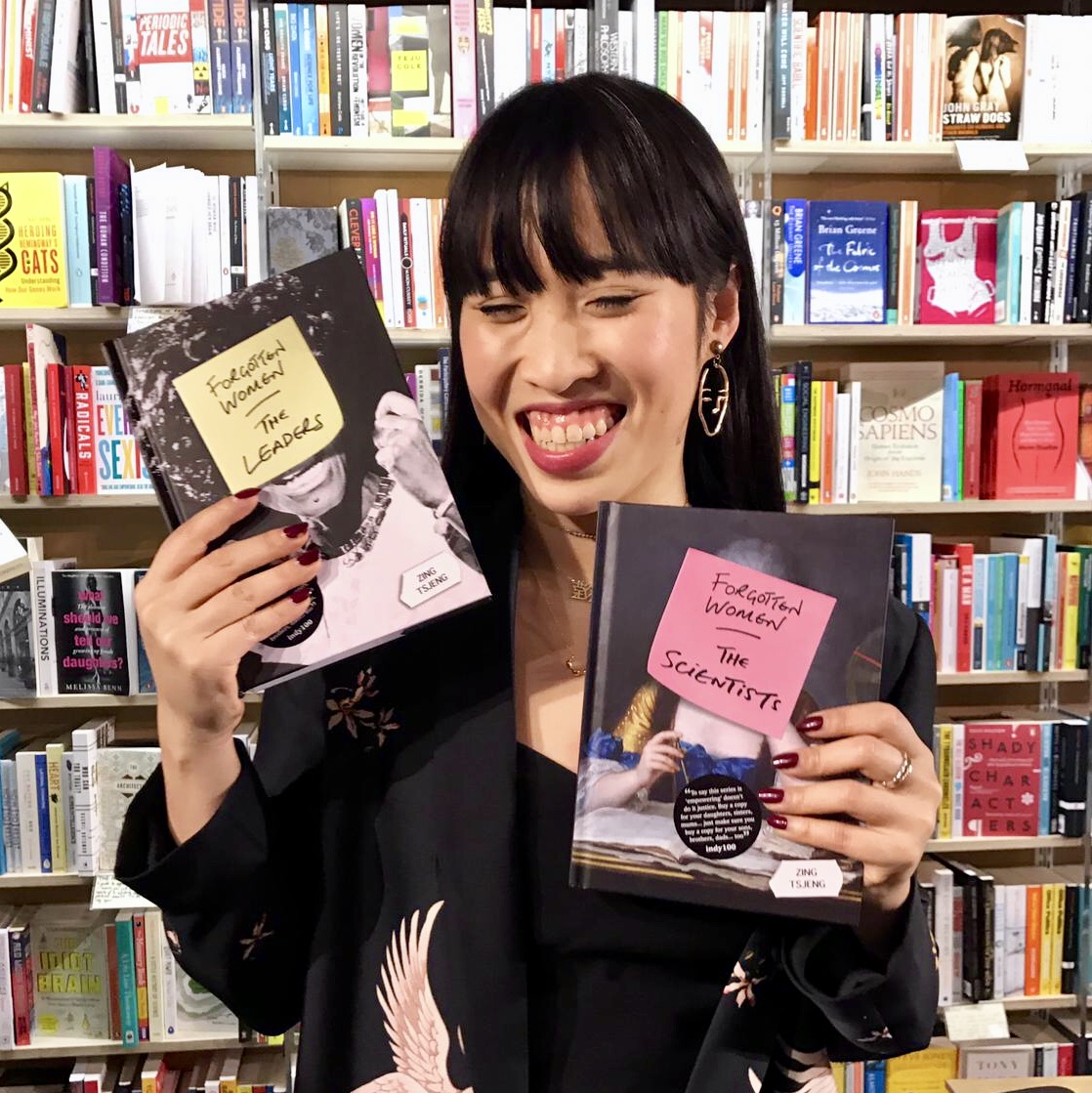
Zing Tsjeng’s new book series, Forgotten Women, is an engaging, accessible deep-dive into the lives of women heroes throughout history that we don’t hear enough about. Beautifully illustrated, the books are written with a light touch and a lot of love. In a roundtable with the gal-dem team, the UK Broadly editor and journalist discussed the first two instalments – Forgotten Women: The Scientists and Forgotten Women: The Leaders – and the responsibility of telling other people’s stories.
Charlie: How did you approach finding forgotten women?
Zing Tsjeng: I wanted to make it as globally representative as possible, with people from all over the world, women of colour, women from all different backgrounds and demographics. We worked with the publishers to come up with a list of women and then worked with an initiative called The New Historia, an American initiative bringing to light all these women’s histories. Academia is full of women in history who never got the recognition they deserved and languished in the depths of JSTOR. Nobody reads about them and it’s quite depressing… I spend a lot of time of JSTOR actually (laughs).
It was like being back at uni. A lot of women didn’t get in, and I was quite gutted. I kind of wanted to do a part one and part two for each book, but I would have probably died! There was a really long Excel spreadsheet I had, basically, with each woman’s nationality, country, age. Just to make sure it hit as many different categories as possible, as I didn’t want it to just be “white women from the 20th century”.
“The reason why these women were forgotten was totally out of their control. The forces of patriarchy and sexism were in action”
Charlie: It was really interesting what you put in the introduction, this idea of women being forgotten over and over again. Could you elaborate on that?
Zing Tsjeng: There’s this idea that forgetting someone is like, “at this time we forgot, and that was it”. But I feel like forgetting is a very long process in which you can be remembered and celebrated at a certain point of time, but if that doesn’t continue you’ll just be forgotten all over again. So there’s one woman called Zenobia, who was the queen of Palmyra, which is in Syria, and for a time she was considered very trendy. In the mid-19th century, people wrote verse about her. Wordsworth composed a poem about her. People would dress up as her – not for Halloween (laughs), but for costume balls and stuff like that. That’s one example in which women can just be really remembered and celebrated in one period and in another period completely forgotten about.
Ifama: I wondered if you felt any guilt, or responsibility to tell as many stories as possible?
Zing Tsjeng: I definitely felt like it was a really big responsibility and people will tell me if I’ve failed or succeeded – it’s not for me to judge. I definitely felt like in some ways that the entire idea of forgotten women implied a value judgement. Like, these women were forgotten, and it was their fault. But I hope I’ve made it clear in the book, in the introduction, that the reason why these women were forgotten was totally out of their control. The forces of patriarchy and sexism were in action. Forgotten doesn’t imply that they deserved to be forgotten in any way, shape or form.

Jinan: How did you retain a sense of motivation throughout and not slightly hate the forgotten women?
Zing Tsjeng: I think because it was so fast. The whole process took place in under a year. I was approached in January last year and then they wanted it to come out by International Women’s Day 2018, and I was like “I’m going to die”. But in the end, I think it was worth it because it taps straight into the conversation everyone is having right now. If this was published in 2019, I don’t know where the conversation about women’s rights would be. At the moment there’s a real appetite for these stories. Even just when I was writing this, stuff was going viral. People were like, “Name a bitch badder than Taylor Swift” – and people were like “what about this woman?” Writing and editing for less than a year was actually good because I’ve got a very short attention span and didn’t get sick of any of these women.
“Ching Shih is one of my favourites. She married into a pirate king’s family and when he died she started shagging his adopted son and mentee. Iconic. And then she took over his entire fleet”
Emma: Are there any stories that have spoken to you the most?
Zing Tsjeng: I feel bad because technically I shouldn’t have favourites. I think one of the first women I was really interested in was this pirate called Ching Shih. I remember seeing her in the Pirates of the Caribbean which is obviously a fictional film, a horrible film. There’s this scene where Johnny Depp goes to the pirate council to ask for permission to do something stupid and one of the pirates is this Chinese woman. I wondered why they had this Chinese pirate in this otherwise very white film.
I looked it up and it was based on the historical figure of Ching Shih. And it turned out her real story is amazing. She was a pirate queen from a time when the entire area of southeast Asia was up for grabs. It was filled with pirates and all these stateless floating villages. She married into a pirate king’s family and when he died she started shagging his adopted son and mentee. Iconic. And then she took over his entire fleet. She was in charge of thousands of sailors and pirates. She implemented a system of laws. So if you were caught – I think the penalty for rape was death. Which is a very strong move. And she was so good at raiding ships and stealing from the government that the Chinese government eventually paid her to retire. She was born in 1775. Not even that long ago, right? She died at the age of 69 which is really old for that time.
Suyin: is there anyone in the book who is inspired by your family?
Zing Tsjeng: According to my mum my family were apparently from a pirate village in China and the reason why they moved to Hong Kong was because they were literally chased out, because people were like, “go away you’re pirates”. So maybe I am a pirate too!
Leah: Do you have a vision for the legacy of the book?
Zing Tsjeng: People have said, “oh this series could go on forever”, which I personally find quite depressing. Not because I don’t want it to go on forever but because I want there to be a point where a book like this isn’t necessary and we accord the same importance to women’s history as men’s history. One of the things that really struck me about this is that people really struggle to name women’s accomplishments and success in pretty much all fields.








